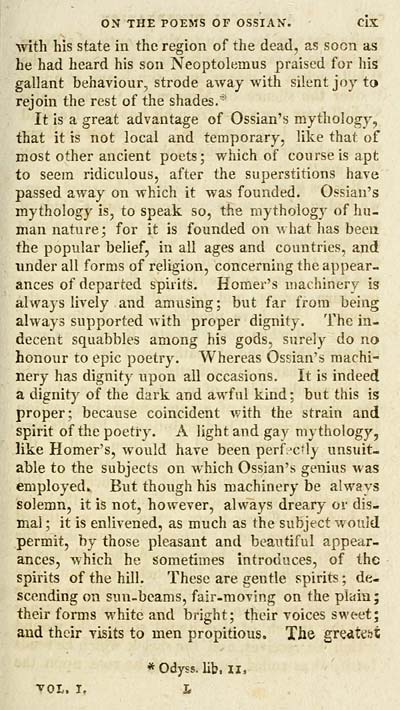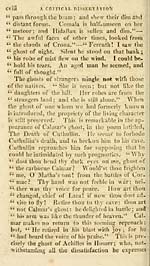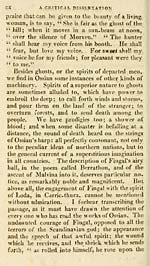Ossian Collection > Poems of Ossian > Volume 1
(127)
Download files
Complete book:
Individual page:
Thumbnail gallery: Grid view | List view

ON THE POEMS OF OSSIAX. CiX
with his state in the region of the dead, as soon as
he had heard his son Neoptolemus praised for his
gallant behaviour, strode away with silent joy to
rejoin the rest of the shades.*
It is a great advantage of Ossian's mythology^
that it is not local and temporary, like that of
most other ancient poets; which of course is apt
to seem ridiculous, after the superstitions have
passed away on which it was founded. Ossian's
mythology is, to speak so, the mythology of hu-
man nature; for it is founded on what has been
the popular belief, in all ages and countries, and
under all forms of religion, concerning the appear-
ances of departed spirits. Homer's machinery is
always lively and amusing ; but far from being
always supported with proper dignity. The in-
decent squabbles among his gods, surely do no
honour to epic poetry. Whereas Ossian's machi-
nery has dignity upon all occasions. It is indeed
a dignity of the dark and awful kind; but this is
proper; because coincident with the strain and
spirit of the poetry. A light and gay mythology,
like Homer's, would have been perf -cHy unsuit-
able to the subjects on which Ossian's genius was
employed. But though his machinery be always
solemn, it is not, however, always dreary or dis-
mal ; it is enlivened, as much as the subject would
permit, by those pleasant and beautiful appear-
ances, which he sometimes introduces, of the
spirits of the hill. These are gentle spirits ; de-
scending on sun-beams, fair-moving on the plain;
their forms M'hite and bright; their voices sweet;
and their visits to men propitious. The gredtebt
^•Odyss. lib, II,
VOL. T, L
with his state in the region of the dead, as soon as
he had heard his son Neoptolemus praised for his
gallant behaviour, strode away with silent joy to
rejoin the rest of the shades.*
It is a great advantage of Ossian's mythology^
that it is not local and temporary, like that of
most other ancient poets; which of course is apt
to seem ridiculous, after the superstitions have
passed away on which it was founded. Ossian's
mythology is, to speak so, the mythology of hu-
man nature; for it is founded on what has been
the popular belief, in all ages and countries, and
under all forms of religion, concerning the appear-
ances of departed spirits. Homer's machinery is
always lively and amusing ; but far from being
always supported with proper dignity. The in-
decent squabbles among his gods, surely do no
honour to epic poetry. Whereas Ossian's machi-
nery has dignity upon all occasions. It is indeed
a dignity of the dark and awful kind; but this is
proper; because coincident with the strain and
spirit of the poetry. A light and gay mythology,
like Homer's, would have been perf -cHy unsuit-
able to the subjects on which Ossian's genius was
employed. But though his machinery be always
solemn, it is not, however, always dreary or dis-
mal ; it is enlivened, as much as the subject would
permit, by those pleasant and beautiful appear-
ances, which he sometimes introduces, of the
spirits of the hill. These are gentle spirits ; de-
scending on sun-beams, fair-moving on the plain;
their forms M'hite and bright; their voices sweet;
and their visits to men propitious. The gredtebt
^•Odyss. lib, II,
VOL. T, L
Set display mode to: Large image | Transcription
Images and transcriptions on this page, including medium image downloads, may be used under the Creative Commons Attribution 4.0 International Licence unless otherwise stated. ![]()
| Early Gaelic Book Collections > Ossian Collection > Poems of Ossian > Volume 1 > (127) |
|---|
| Permanent URL | https://digital.nls.uk/77947713 |
|---|
| Shelfmark | Oss.79 |
|---|---|
| Additional NLS resources: | |
| Attribution and copyright: |
|
| Description | " ... to which are prefixed, 'Dissertations on the aera and poems of Ossian translated by James Macpherson'". |
|---|---|
| Shelfmark | Oss.79-80 |
| Additional NLS resources: | |
| Description | Selected books from the Ossian Collection of 327 volumes, originally assembled by J. Norman Methven of Perth. Different editions and translations of James MacPherson's epic poem 'Ossian', some with a map of the 'Kingdom of Connor'. Also secondary material relating to Ossianic poetry and the Ossian controversy. |
|---|
| Description | Selected items from five 'Special and Named Printed Collections'. Includes books in Gaelic and other Celtic languages, works about the Gaels, their languages, literature, culture and history. |
|---|

